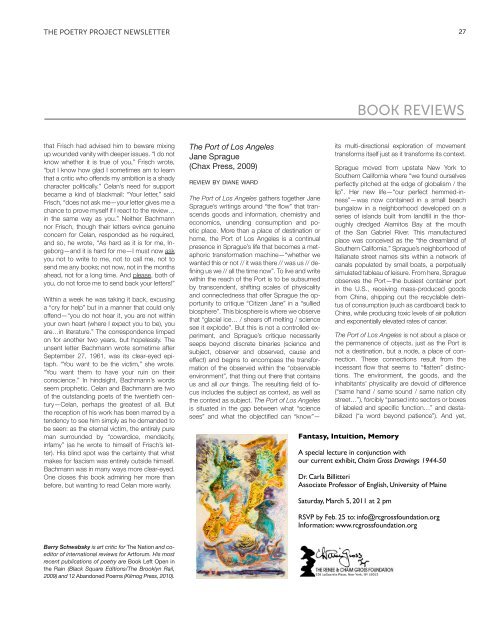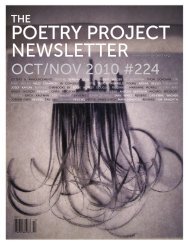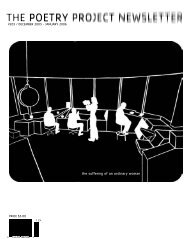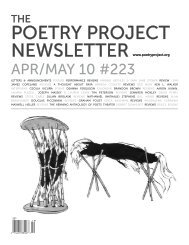You also want an ePaper? Increase the reach of your titles
YUMPU automatically turns print PDFs into web optimized ePapers that Google loves.
THE POETRY PROJECT NEWSLETTER27BOOK REVIEWSthat Frisch had advised him to beware mixingup wounded vanity with deeper issues. “I do notknow whether it is true of you,” Frisch wrote,“but I know how glad I sometimes am to learnthat a critic who offends my ambition is a shadycharacter politically.” Celan’s need for supportbecame a kind of blackmail: “Your letter,” saidFrisch, “does not ask me—your letter gives me achance to prove myself if I react to the review…in the same way as you.” Neither Bachmannnor Frisch, though their letters evince genuineconcern for Celan, responded as he required,and so, he wrote, “As hard as it is for me, Ingeborg—andit is hard for me—I must now askyou not to write to me, not to call me, not tosend me any books; not now, not in the monthsahead, not for a long time. And please, both ofyou, do not force me to send back your letters!”Within a week he was taking it back, excusinga “cry for help” but in a manner that could onlyoffend—“you do not hear it, you are not withinyour own heart (where I expect you to be), youare…in literature.” <strong>The</strong> correspondence limpedon for another two years, but hopelessly. <strong>The</strong>unsent letter Bachmann wrote sometime afterSeptember 27, 1961, was its clear-eyed epitaph.“You want to be the victim,” she wrote.“You want them to have your ruin on theirconscience.” In hindsight, Bachmann’s wordsseem prophetic. Celan and Bachmann are twoof the outstanding poets of the twentieth century—Celan,perhaps the greatest of all. Butthe reception of his work has been marred by atendency to see him simply as he demanded tobe seen: as the eternal victim, the entirely pureman surrounded by “cowardice, mendacity,infamy” (as he wrote to himself of Frisch’s letter).His blind spot was the certainty that whatmakes for fascism was entirely outside himself.Bachmann was in many ways more clear-eyed.One closes this book admiring her more thanbefore, but wanting to read Celan more warily.<strong>The</strong> Port of Los AngelesJane Sprague(Chax Press, 2009)review by diane ward<strong>The</strong> Port of Los Angeles gathers together JaneSprague’s writings around “the flow” that transcendsgoods and information, chemistry andeconomics, unending consumption and poeticplace. More than a place of destination orhome, the Port of Los Angeles is a continualpresence in Sprague’s life that becomes a metaphorictransformation machine—“whether wewanted this or not // it was there // was us // definingus we // all the time now”. To live and writewithin the reach of the Port is to be subsumedby transcendent, shifting scales of physicalityand connectedness that offer Sprague the opportunityto critique “Citizen Jane” in a “sulliedbiosphere”. This biosphere is where we observethat “glacial ice… / shears off melting / sciencesee it explode”. But this is not a controlled experiment,and Sprague’s critique necessarilyseeps beyond discrete binaries (science andsubject, observer and observed, cause andeffect) and begins to encompass the transformationof the observed within the “observableenvironment”, that thing out there that containsus and all our things. <strong>The</strong> resulting field of focusincludes the subject as context, as well asthe context as subject. <strong>The</strong> Port of Los Angelesis situated in the gap between what “sciencesees” and what the objectified can “know”—its multi-directional exploration of movementtransforms itself just as it transforms its context.Sprague moved from upstate New York toSouthern California where “we found ourselvesperfectly pitched at the edge of globalism / thelip”. Her new life—“our perfect hemmed-inness”—wasnow contained in a small beachbungalow in a neighborhood developed on aseries of islands built from landfill in the thoroughlydredged Alamitos Bay at the mouthof the San Gabriel River. This manufacturedplace was conceived as the “the dreamland ofSouthern California.” Sprague’s neighborhood ofItalianate street names sits within a network ofcanals populated by small boats, a perpetuallysimulated tableau of leisure. From here, Spragueobserves the Port—the busiest container portin the U.S., receiving mass-produced goodsfrom China, shipping out the recyclable detritusof consumption (such as cardboard) back toChina, while producing toxic levels of air pollutionand exponentially elevated rates of cancer.<strong>The</strong> Port of Los Angeles is not about a place orthe permanence of objects, just as the Port isnot a destination, but a node, a place of connection.<strong>The</strong>se connections result from theincessant flow that seems to “flatten” distinctions.<strong>The</strong> environment, the goods, and theinhabitants’ physicality are devoid of difference(“same hand / same sound / same nation citystreet…”), forcibly “parsed into sectors or boxesof labeled and specific function…” and destabilized(“a word beyond patience”). And yet,Fantasy, Intuition, MemoryA special lecture in conjunction withour current exhibit, Chaim Gross Drawings 1944-50Dr. Carla BillitteriAssociate Professor of English, University of MaineSaturday, March 5, 2011 at 2 pmRSVP by Feb. 25 to: info@rcgrossfoundation.orgInformation: www.rcgrossfoundation.orgBarry Schwabsky is art critic for <strong>The</strong> Nation and coeditorof international reviews for Artforum. His mostrecent publications of poetry are Book Left Open inthe Rain (Black Square Editions/<strong>The</strong> Brooklyn Rail,2009) and 12 Abandoned Poems (Kilmog Press, 2010).
















